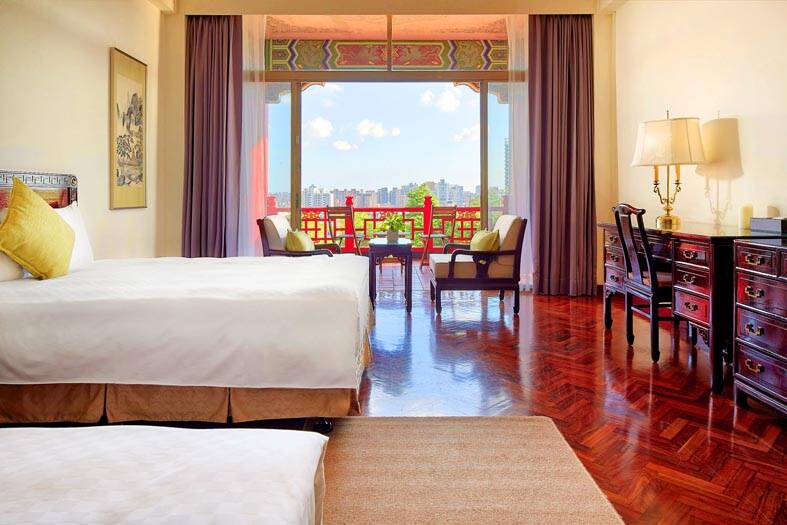From 2025, hotels in Taiwan would be restricted from supplying single-use toiletries unless they are specifically requested, the Environmental Protection Administration (EPA) said on Monday.
Under the new guidelines, which the EPA announced on its Web site, liquid toiletries such as shampoo, conditioner, shower gel and lotion would have to be provided in bottles with a volume of at least 180ml.
Meanwhile, disposable items such as combs, razors, toothbrushes, toothpaste and shower caps would no longer be offered in guests’ rooms, although hotels would be allowed to provide them on request, the EPA said.

Photo courtesy of the Kaohsiung Tourism Bureau via CNA
The regulations would not apply to hotel facilities outside of guest rooms, such as spas or swimming pools, the agency said.
The EPA reviewed the new regulations in January and initially said that stage one of the plan would be implemented on July 1, which did not happen.
The implementation date was changed to Jan. 1, 2025, to give the estimated 14,500 affected hotels, bed and breakfast facilities and catered campsites enough time to adapt, Wang Yueh-pin (王嶽斌), executive secretary of the EPA’s Recycling Fund Management Board, said in an interview on Monday.
By mandating the use of larger, reusable bottles for toiletries in hotels, the EPA estimated that plastic waste from smaller, disposable bottles could be cut by about 2,100 tonnes per year.
Hotels found contravening the rules would face a fine of NT$1,200 to NT$6,000, with the possibility of further penalties if no improvements are made, the EPA said.

Alain Robert, known as the "French Spider-Man," praised Alex Honnold as exceptionally well-prepared after the US climber completed a free solo ascent of Taipei 101 yesterday. Robert said Honnold's ascent of the 508m-tall skyscraper in just more than one-and-a-half hours without using safety ropes or equipment was a remarkable achievement. "This is my life," he said in an interview conducted in French, adding that he liked the feeling of being "on the edge of danger." The 63-year-old Frenchman climbed Taipei 101 using ropes in December 2004, taking about four hours to reach the top. On a one-to-10 scale of difficulty, Robert said Taipei 101

Nipah virus infection is to be officially listed as a category 5 notifiable infectious disease in Taiwan in March, while clinical treatment guidelines are being formulated, the Centers for Disease Control (CDC) said yesterday. With Nipah infections being reported in other countries and considering its relatively high fatality rate, the centers on Jan. 16 announced that it would be listed as a notifiable infectious disease to bolster the nation’s systematic early warning system and increase public awareness, the CDC said. Bangladesh reported four fatal cases last year in separate districts, with three linked to raw date palm sap consumption, CDC Epidemic Intelligence

Taiwanese and US defense groups are collaborating to introduce deployable, semi-autonomous manufacturing systems for drones and components in a boost to the nation’s supply chain resilience. Taiwan’s G-Tech Optroelectronics Corp subsidiary GTOC and the US’ Aerkomm Inc on Friday announced an agreement with fellow US-based Firestorm Lab to adopt the latter’s xCell, a technology featuring 3D printers fitted in 6.1m container units. The systems enable aerial platforms and parts to be produced in high volumes from dispersed nodes capable of rapid redeployment, to minimize the risk of enemy strikes and to meet field requirements, they said. Firestorm chief technology officer Ian Muceus said

MORE FALL: An investigation into one of Xi’s key cronies, part of a broader ‘anti-corruption’ drive, indicates that he might have a deep distrust in the military, an expert said China’s latest military purge underscores systemic risks in its shift from collective leadership to sole rule under Chinese President Xi Jinping (習近平), and could disrupt its chain of command and military capabilities, a national security official said yesterday. If decisionmaking within the Chinese Communist Party has become “irrational” under one-man rule, the Taiwan Strait and the regional situation must be approached with extreme caution, given unforeseen risks, they added. The anonymous official made the remarks as China’s Central Military Commission Vice Chairman Zhang Youxia (張又俠) and Joint Staff Department Chief of Staff Liu Zhenli (劉振立) were reportedly being investigated for suspected “serious